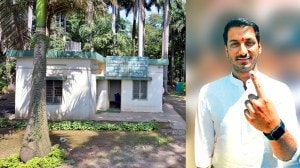2010 Games,World Cup huge security challenges
India remains under pressure from terror groups who need to score victories in a vulnerable part of the world,and next years Commonwealth Games...
India remains under pressure from terror groups who need to score victories in a vulnerable part of the world,and next years Commonwealth Games and the cricket World Cup a year later need to be given top priority by security agencies as they appear to be most threatened,says Michael Chertoff,the US Secretary for Homeland Security under the Bush administration who was in office during 26/11.
Chertoff,the second secretary of the department which was created after 9/11 and co-author of the controversial Patriot Act,was in Mumbai for a security conference held to mark the first anniversary of the November 26 attack by Lashkar-e-Toiba terrorists. He said it was very well that India was focusing strongly on securing its financial capital and while that is important,it is not the only thing because the enemy is also going to look at other things,he told The Indian Express.
You are never done with these preparations because the enemy keeps changing the plan and the enemys watching you. So you can never have the mentality,that ok,we did these things now and its finished and we can stop. We have to constantly be evolving, said Chertoff,whose department closely co-ordinated with India in the aftermath of 26/11 and who now heads a security and risk management consulting firm called the Chertoff Group.
You have some events coming up,you have the Commonwealth Games and the World Cup of cricket. These are always wonderful events but I can tell you that having been involved in securing major events in the United States over the last 8-10 years,they are very very challenging, said Chertoff,55.
First of all,they are attractive to millions of people. How you manage that in terms of whos coming in,how you manage the flow,these are very very difficult. We know that India is a focus of attacks and we also know that sporting events tend to be attractive to terrorists. We saw that with the cricketers in Pakistan,going all the way back to 1972 in the Olympics.
Known as a blunt-speaking and tough-as-nails prosecutor with vast experience in fighting terrorism,Chertoff was the head of the US Justice Departments Criminal Division in the months after 9/11 and was appointed as Homeland Security Secretary in early 2005. He believes that a countrys anti-terrorism effort should be based on an assessment of risk and that if a country wants to try and prevent the most nightmarish attacks,it must focus on the most consequential threats. And right now,a mass casualty event one where a lot of people can be killed in one place through simultaneous or waves of attacks is most worrisome,he said.
While the United States has invested a lot in trying to protect itself and also enjoys some geographical advantage as it is some distance from the breeding and training grounds of terrorists,the same could not be said of India,said Chertoff. Here,as Mumbai reveals,you are very close to areas in the world where there are significant training activities. Whether it is the frontier of Pakistan or whether it is Somalia. So you have a large border and you got people who can come in by sea,they can come in by land they can come in by air. Thats a very challenging environment…you are in proximity to people who are very very dangerous.
The terror factories in the region also need frequent successes to be able to sustain and boost their movements. One thing that will deter them is failure. So they will clearly continue to try to attack the United States and Great Britain and Western Europe but to the extent that we make it harder and they think there is a place which is more vulnerable,the advantage to them of a more vulnerable place is that they have a success, Chertoff said.
One of the things that is important for terrorists is they need to show their supporters that they are winning. If the supporters begin to feel that the terrorists are not making progress then they begin to lose faith. So in many ways it is a battle to establish in the minds of the potential recruits this is the winning team,people want to join the winning team. Thats why I think theres pressure on India because it is in a dangerous neighbourhood,which is what we are seeing, Chertoff said.
What US learnt from 26/11
• How to deal with rolling,commando type assaults with explosives,firearms,moving from place to place
• How to coordinate command and control at attack scene
• Have capability on scene or nearby to launch counter-attack
• Have emergency plan for any significant hotel or large institution where theres risk
• Have plan to shelter people fleeing an attack
• How to communicate,evacuate trapped people
• How to communicate with local police



- 01
- 02
- 03
- 04
- 05




























